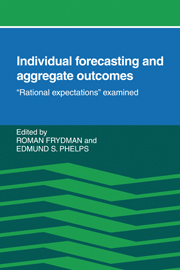Book contents
- Frontmatter
- Contents
- List of contributors
- Preface
- 1 Introduction
- 2 The trouble with “rational expectations” and the problem of inflation stabilization
- 3 Expectations of others' expectations and the transitional nonneutrality of fully believed systematic monetary policy
- 4 The stability of rational expectations in macroeconomic models
- 5 Individual rationality, decentralization, and the rational expectations hypothesis
- 6 Convergence to rational expectations equilibrium
- 7 A distinction between the unconditional expectational equilibrium and the rational expectations equilibrium
- 8 On mistaken beliefs and resultant equilibria
- 9 Equilibrium theory with learning and disparate expectations: some issues and methods
- 10 Keynesianism, monetarism, and rational expectations: some reflections and conjectures
- Index
2 - The trouble with “rational expectations” and the problem of inflation stabilization
Published online by Cambridge University Press: 05 June 2012
- Frontmatter
- Contents
- List of contributors
- Preface
- 1 Introduction
- 2 The trouble with “rational expectations” and the problem of inflation stabilization
- 3 Expectations of others' expectations and the transitional nonneutrality of fully believed systematic monetary policy
- 4 The stability of rational expectations in macroeconomic models
- 5 Individual rationality, decentralization, and the rational expectations hypothesis
- 6 Convergence to rational expectations equilibrium
- 7 A distinction between the unconditional expectational equilibrium and the rational expectations equilibrium
- 8 On mistaken beliefs and resultant equilibria
- 9 Equilibrium theory with learning and disparate expectations: some issues and methods
- 10 Keynesianism, monetarism, and rational expectations: some reflections and conjectures
- Index
Summary
The hypothesis of rational expectations, as ordinarily defined, makes a crucial assumption that is in some circumstances difficult or impossible to justify. The essence of rational expectations – rational in the sense of Muth – is that, according to the hypothesis, each agent uses the modeler's own model to make the forecasts of the endogenous variables, like prices and income, that (together with his exogenous parameter estimates) determine his actions. Of course, a market model makes the behavior of an endogenous variable, such as the money price level, a function of certain actions taken by the totality of individual agents, such as the aggregate output supplied to the goods market. Therefore, to forecast the endogenous variables as predicted by the model, each agent must forecast the other agents' forecasts of the endogenous variables and their forecasts of the exogenous parameters. It is at this point that a difficulty may arise: The individual agent cannot generally know what the other agents expect the weather, cultural fashions, and social policy to be; so how will he decide, or estimate, these expectations held by the others (if indeed they hold any)?
The rational expectations hypothesis meets this difficulty with the implicit assumption that, in fact, each agent supposes the other agents to have the same expectations about the various exogenous parameters that he has.
- Type
- Chapter
- Information
- Individual Forecasting and Aggregate Outcomes'Rational Expectations' Examined, pp. 31 - 46Publisher: Cambridge University PressPrint publication year: 1984
- 17
- Cited by



